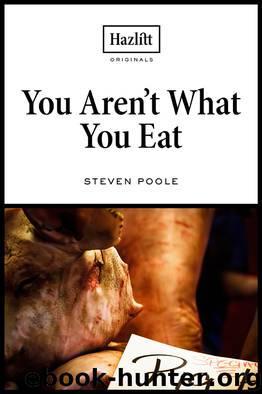You Aren't What You Eat by Steven Poole

Author:Steven Poole
Language: eng
Format: mobi
ISBN: 9780771069031
Publisher: McClelland & Stewart
Published: 2012-10-16T00:00:00+00:00
9.
Back to Nature
The best guarantor of food’s authenticity is Nature herself. What is ‘natural’ is ipso facto maximally authentic, and so worthy of our respect. Indeed foodists regularly invoke, as one of their own cardinal virtues, ‘respect for the ingredient’. How much ‘respect’ it can show to a blameless carrot (and foodists do claim to respect even vegetables) to rip it from the soil (thus killing it), then chop it, boil it, masticate it, and introduce it to the acids and bacteria of the human digestive tract is a nice question; let alone that of just how much ‘respect’ one shows a cow or pig by slaughtering it. On one episode of MasterChef: The Professionals in 2011, contestants had to prepare a wood pigeon to make it ready for roasting. Pleased with one man’s job, Monica Galetti commented: ‘He treated that pigeon with the respect it deserved.’ The exact amount of respect it deserved, apparently, was to have its wings and head cut off with scissors, its feathers and entrails pulled out, and its stumps trussed to its torso. In just the same way, one can use the phrase ‘with all due respect’ as refined sarcasm to mean ‘with just that amount of respect I consider you deserve: in other words, none’.
The idea that dismembering, heating, and chewing other organisms shows ‘respect’ for them seems to imply a very convenient teleology: that these things are all somehow destined for our stomachs, so that becoming obsessed about helping them into ourselves is the righteous way for us to contribute to the gradual Hegelian coming-to-know-itself of the world-gullet. Moreover, if a mushroom or a partridge actually desires to be eaten, it would be positively rude of us not to. The foodist, I suppose, does not quite believe that the life forms he consumes are like the cows in Douglas Adams’s Restaurant at the End of the Universe, which walk up to diners’ tables and happily chat about which bits of them are tastiest before ambling off to be killed and cooked. (Though higher-end steak joints such as the Gaucho Grill in London do now bring round examples of the raw cuts on a ‘meat board’; and A.A. Gill describes sardonically another restaurant where the waiter ‘intimates the last meals of the condemned. This one ate corn, this one grass, this one had beer and a massage’.)1 Nor, I suppose, does the foodist quite share the notion of the eighteenth-century Scottish philosopher Thomas Reid, that vegetables have immaterial souls. Nor, again, do most foodists follow the strict version of Jainism according to which root vegetables such as potatoes and onions are eschewed because the whole plant would be killed. But then the foodists avowal of ‘respect’ for what he is eating looks all the more like sanctimoniousself-advertisement.
Thomas Keller, the foodists’ foodist and cooks’ cook, is very respectful. ‘Another source of pleasure in cooking is respect for the food,’ he avers. ‘Respect for food is a respect for life.’2 (Excluding, presumably, the life, of tuber or turtle, that has been taken for your incipient oral pleasure.
Download
This site does not store any files on its server. We only index and link to content provided by other sites. Please contact the content providers to delete copyright contents if any and email us, we'll remove relevant links or contents immediately.
A Court of Wings and Ruin by Sarah J. Maas(7809)
The Death of the Heart by Elizabeth Bowen(3602)
The Sprouting Book by Ann Wigmore(3583)
Better Homes and Gardens New Cookbook by Better Homes & Gardens(3579)
BraveTart by Stella Parks(3440)
Salt, Fat, Acid, Heat: Mastering the Elements of Good Cooking by Nosrat Samin(3138)
Sauces by James Peterson(3088)
Kitchen confidential by Anthony Bourdain(3078)
The Bread Bible by Rose Levy Beranbaum(3064)
Classic by Mary Berry(3008)
Solo Food by Janneke Vreugdenhil(2965)
Ottolenghi - The Cookbook by Yotam Ottolenghi(2928)
Martha Stewart's Baking Handbook by Martha Stewart(2851)
Day by Elie Wiesel(2778)
Betty Crocker's Good and Easy Cook Book by Betty Crocker(2712)
My Pantry by Alice Waters(2608)
The Plant Paradox by Dr. Steven R. Gundry M.D(2601)
The Kitchen Counter Cooking School by Kathleen Flinn(2515)
Hot Sauce Nation by Denver Nicks(2488)
